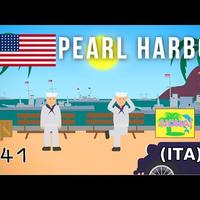1941, l'attacco a PEARL HARBOR (ITA) | Storia della Seconda Guerra Mondiale
the attack||||Italy|||||
1941, der Angriff auf PEARL HARBOR (ITA) | Geschichte des Zweiten Weltkriegs
1941, the attack on PEARL HARBOR (ITA) | History of World War II
1941, el ataque a PEARL HARBOR (ITA) | Historia de la Segunda Guerra Mundial
1941, attaque de PEARL HARBOR (ITA) | Histoire de la Seconde Guerre mondiale
1941年、真珠湾攻撃(イタリア)|第二次世界大戦史
1941, de aanval op PEARL HARBOR (ITA) | Geschiedenis van de Tweede Wereldoorlog
1941, atak na PEARL HARBOR (ITA) | Historia II wojny światowej
1941, o ataque a PEARL HARBOR (ITA) | História da Segunda Guerra Mundial
1941 год, нападение на ПИАРЛ-ХАРБОР (ITA) | История Второй мировой войны
1941, anfallet mot PEARL HARBOR (ITA) | Andra världskrigets historia
Il 7 dicembre 1941, centinaia di aerei da combattimento giapponesi attaccarono la base
||hundreds||||||attacked||base
Am 7. Dezember 1941 griffen Hunderte von japanischen Kampfflugzeugen den Stützpunkt an
On December 7, 1941, hundreds of Japanese fighter jets attacked the base
navale americana di Pearl Harbor, vicino a Honolulu, nelle Hawaii.
naval|||||||Honolulu||Hawaii
|||||||Honolulu||
US-Marinestützpunkt Pearl Harbor, in der Nähe von Honolulu, Hawaii.
Pearl Harbor, near Honolulu, Hawaii
Giappone e Stati Uniti erano sul piede di guerra da decenni.
||||||edge||||decades
Japan und die Vereinigten Staaten befanden sich schon seit Jahrzehnten auf dem Kriegspfad.
Japan and the United States had been on a war footing for decades.
Gli Stati Uniti erano scontenti del modo in cui l'Impero Giapponese stava trattato la
||||unzufrieden|||||||||
||||unhappy||||||||treated|
||||descontentos|||||||||
Die Vereinigten Staaten waren unzufrieden mit der Art und Weise, wie das japanische Kaiserreich die
The United States was unhappy with the way the Japanese Empire was treated there
Cina e cessò di fornirgli petrolio. Nessuno credeva che il Giappone avrebbe attaccato
||hörte auf||liefern||Niemand||||||
||ceased||provide him|oil|||||||
||przestała||dostarczać mu|ropy|||||||
China und stellte die Öllieferungen an China ein. Keiner glaubte, dass Japan angreifen würde
China and stopped supplying it with oil. Nobody believed that Japan would attack
il suolo americano. Ma il piano giapponese consisteva nel bombardare
|Boden||||||||
|soil||||||||bombing
amerikanischen Boden. Aber der japanische Plan war, die
American soil. But the Japanese plan was to bomb
la flotta americana senza lasciargli il tempo per contrattaccare.
||||leaving him||||counterattack
||||zostawienie mu||||kontratakować
die amerikanische Flotte, ohne ihnen Zeit für einen Gegenangriff zu geben.
the American fleet without giving them time to fight back.
La maggior parte delle navi da corsa erano attraccate/ancorate nel porto e subirono grossi
||||||||docked|anchored||||suffered large|
||||||||przycumowane|zakotwiczone||||przeżyły|
Die meisten der Rennschiffe waren im Hafen angedockt/verankert und erlitten große
Most of the racing ships were docked / anchored in the harbor and suffered big ones
A maioria dos navios de guerra estavam atracados/ancorados no porto e sofreram danos graves
danni dagli aerei giapponesi che riempirono il cielo.
|||||füllten||
|||||filled||
|||||napełniły||
Schäden durch die japanischen Flugzeuge, die den Himmel füllten.
damage from Japanese aircraft that filled the sky.
dos aviões japoneses que encheram o céu.
Una bomba, penetrata nel ponte della USS Arizona, provocò l'esplosione della nave, affondando,
||||||||||||sank
||penetrated||bridge||USS Arizona|USS Arizona||the explosion||ship|sinking
||penetrując|||||||eksplozję|||tonąc
Eine Bombe, die das Deck der USS Arizona durchschlug, ließ das Schiff explodieren und sinken,
A bomb, which penetrated the deck of the USS Arizona, caused the ship to explode, sinking,
Uma bomba, ao penetrar no convés do USS Arizona, provocou a explosão do navio, afundando,
con più di 1.000 uomini intrappolati dentro. Non appena i marinai americani vennero catturati,
||||||||||||gefangen genommen
||||trapped|||||sailors|||captured
||||uwięzionych||||||||
und mehr als 1.000 Männer waren darin gefangen. Sobald die amerikanischen Matrosen gefangen genommen wurden,
with more than 1,000 men trapped inside. As soon as the American sailors were captured,
l'attacco giapponese a Pearl Harbor danneggiò quasi 20 navi americane e più di 300 aerei.
|||||damaged||ships|||||
|||||uszkodził|||||||
der japanische Angriff auf Pearl Harbor beschädigte fast 20 amerikanische Schiffe und mehr als 300 Flugzeuge.
the Japanese attack on Pearl Harbor damaged nearly 20 American ships and more than 300 aircraft.
2.500 vittime e altri 1000 feriti.
|||injured
2.500 Tote und weitere 1.000 Verletzte.
2,500 victims and another 1,000 injured.
I giapponesi non riuscirono a distruggere l'intera la flotta del Pacifico.
|||they succeeded||to destroy|the entire||fleet||
Die Japaner waren nicht in der Lage, die gesamte Pazifikflotte zu zerstören.
The Japanese failed to destroy the entire Pacific fleet.
La maggior parte dei aerei erano lontani dalla base e i cantieri navali e i sottomarini rimasero
|||||||||||Werften|||||
||||||distant|||||shipyards||||submarines|remained
|||||||||||stocznie||||określone|pozostały
Die meisten Flugzeuge waren weit vom Stützpunkt entfernt und die Werften und U-Boote blieben
Most of the planes were far from the base and the shipyards and submarines remained
intatti. Il giorno dopo, il presidente Roosevelt fece
intact||||||Roosevelt|
||||||Roosevelt|zrobił
intakt. Am nächsten Tag erklärte Präsident Roosevelt
intact. The next day, President Roosevelt did
un discorso su come gli Stati Uniti d'America furono volutamente attaccati all'improvviso.
|||||||||absichtlich||
|speech||||||||deliberately|attacked|suddenly
|||||||||celowo||
eine Rede darüber, wie die Vereinigten Staaten von Amerika absichtlich aus heiterem Himmel angegriffen wurden.
a talk about how the United States of America was deliberately suddenly attacked.
Gli Stati Uniti entrarono così nella Seconda Guerra Mondiale.
the|States|||||||
Damit traten die Vereinigten Staaten in den Zweiten Weltkrieg ein.
The United States thus entered the Second World War.
Iscriviti al nostro canale per altri episodi.
Abonnieren Sie unseren Kanal für weitere Episoden.

